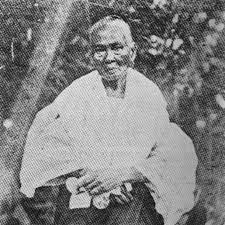From Renato Perdon’s collection of historical writing. Melchora Aquino also known as Tandang Sora was born 6 January 1812, written 10 years ago,
BEHIND the face of machismo the Philippines is a matriarchal society. It is therefore not surprising to find strong willed women to emerge in its national struggle against foreign colonial invaders.
One such woman was Melchora Aquino, the Philippines counterpart of Florence Nightingale of the Crimean War (1854), whose contribution to Philippines revolution (1896-1898) included the feeding and nursing the Filipino revolutionists against Spain, for which activity led to her arrest and suffered six years of lonely exile in Guam in the Marianas Islands, for the cause of freedom

Regarded in the Philippines as the mother of Philippine Revolution she was born on the Feast of the three Kings, 6 January 1812, to a prosperous farmer parents, Juan Aquino and Valentina de Aquino, in barrio Banlat, then part of Caloocan City. From a humble beginning her hardworking parents provided stable life for the family of six children.
Nothing much is known of her growing up, except she was called Tandang Sora in her old age. She married Fulgencio Ramos, a cabeza de barangay (barrio captain) of the small village of Banilad, now part of Quezon City.
The couple owned a huge tract of farm land which they worked hard, supplementing their income by her managing a mixed store at the ground floor of their big house. It was in that variety store that members of the underground movement called Katipunan, a secret society aimed to overthrow the Spanish colonial government, would take a rest on their way to the neighbouring town of San Mateo, Morong, now Rizal.
Early in her married life, her husband died leaving her alone to take care of the farm and their children. Being a woman of strong willed character, courage, industry, patience, nobility she rose to the challenge and being used to hard work, she successfully managed the family as a single mother.
A more lofty and ideal task for her country was destined to come when she was already in her 80s. In 1895, when Andres Bonifacio, founder of the Katipunan, with his trusted henchmen like Emilio Jacinto, Guillermo Masangkay and Dr. Pio Valenzuela visited the village and had a meeting at her house to plan the revolution. This meeting was followed by a number of meetings towards the end of the following year. She was already involved with the secret society.
When the Philippine revolution broke out in August 1896, she found herself in the noble task of supporting the revolutionary movement by providing food and shelter to the revolutionists and nursed those who fell sick or were wounded in bloody encounter with the Spanish civil guards and infantrymen.
One of her biographers described that part of her life and stated: Day in day out, rebels swarmed Tandang Soras house. She tended dutifully to the wounded day and night, rescuing many from the clutches of death. Katipuneros [revolutionists] in tattered rags she clothed decently, and the hungry she fed till their stomachs could hold no more. Slowly but steadily the fortune of Tandang Sora was eaten away as a result of her open-heartedness. Being raised a Catholic, she believed that she was just abiding by the biblical injunction that the hungry should be fed, the naked be clothed, and the homeless be provided with a roof over their heads.
Her activities supporting the struggle for the emancipation of the Filipinos brought to the attention of the Spanish authorities. Few days after the Philippine Revolution that broke out on 23 August 1896, she was arrested on the charges of giving aid and comfort to the rebels. For eight days, she was subjected to gruelling interrogationg, suffered indignities and physical abused, but she was firmed in her decision not to reveal the hideout of Bonifacio and his men.
The Spanish authorities were frustrated on her refusal to accept the charges of treason which were accused of her. Without the benefit of a court trial only by virtue of a decree issued by the Spanish Governor General of the Philippines, she was deported to Guam in the Marianas which was being administered by the Spanish authorities based in Manila.
She joined Apolinario Mabini, the brains of the Philippine revolution, and other Filipino patriots exiled in that island prison. She was confined strictly to the prison compound and not allowed to travel any place in the island. However, she continued providing motherly care to the imprisoned revolutionists.
A rich Filipino resident of Guam, Don Justo Dunca, was able to make arrangement for her to stay in his family home as a household help, and soon regarded her as a member of the family.
Her six years exile in Guam ended 26 February 1903, when Tandang Sora, then already in her early 90s, together with other Filipino patriots took their oath of allegiance to the American and were given their freedom to return to the Philippines. The group landed in Manila on board the S.S. Uranus.
She returned to her home in Barrio Banlat, now part of Quezon City. Her homecoming was marked by a celebration in honour of her contribution to the Philippine struggle for independence.
Upon her return to the Philippines, she lived in obscurity with her surviving children, and led a simple and frugal life for not even a little pension from the government for her patriotic services to the country was ever granted her.
But she was not after material recognition of her contribution. She cherished the time she was able to contribute in making the Philippines free from foreign bondage. She died on 2 March 1919 at the ripe age of 109 years. This year we celebrate the bicentennial of her birth







Leave a Reply